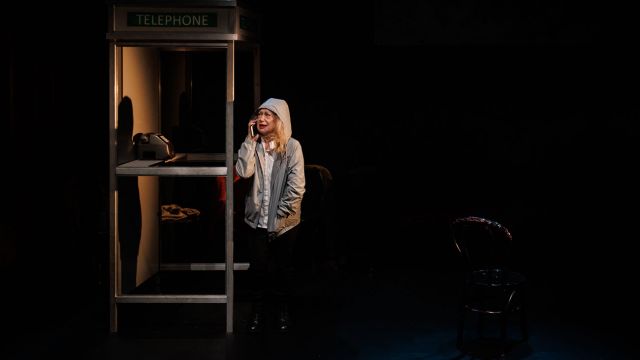WAY
Michael Brindley saw WAY at its premiere at La Mama Courthouse in March 2023. Here is an edited version of what he wrote then – followed by his impressions on revisiting the play here in its second iteration at fortyfivedownstairs.
Way is driven by passion and shaped by theatrical skill honed by years of experience. This seventy-five-minute play could easily tip into agit-prop or political pamphlet. Instead the play engages us by interweaving a (fictional) personal story which has itself a rising tension as it builds toward a crisis.
Lyn (McKenzie) is a professional documentary filmmaker and teacher. She has shot hours and hours of interviews with over-55 homeless women (couch surfing, living in their cars, literally begging on the street) and assembled a rough cut. Now she is waiting on a decision from a ‘broadcaster’ on whether they will buy the film. Lyn badly needs the money to finish the film – and – quite simply – to live. But the broadcaster, while cagily encouraging, is delaying, sticking at Lyn’s adamant refusal to put the women’s faces on screen. ‘I don’t want to make pity porn,’ Lyn insists via phone to the executive with whom she must deal.

Nor do we see the women’s faces: we see the backs of their heads and their names projected on a large screen above the on-stage action. Their interviews and personas are ably created by McKenzie, who distinguishes them from ‘Lyn’ by different syntaxes and changes of jacket.
Meanwhile, Lyn is sliding into a financial hole herself. Her teaching hours are cut, and she must make humiliating phone calls to her elderly mother, begging for yet another loan… The repeated theme here is that for women (mostly women), ‘It just takes one little thing to go wrong… ‘
What’s implicit is, ‘This could happen to you.’
The text is not without ambiguities and ironies. Is Lyn idealistic or naïve to think she would sell a ‘worthy’ documentary to a broadcaster in the current climate? Are her teaching hours cut because of budget cuts or a lack of enrolments? Was it just ‘one little thing’ in all cases that rendered her homeless women homeless?
If the play does tip into agit-prop just a bit, it is via the terrible statistics that intersperse the drama, projected on that big screen. E.g., since 2018, the number of older women experiencing homelessness has increased by 31%. We know these statistics – or we could if we wanted - but they seem to stay as statistics – and we look away. That woman, say, on the corner of Collins and Spencer Streets has a story - as Lyn’s women have stories.

Yes, the intention is to arouse awareness and anger, but McKenzie grips the audience’s attention for a complex seventy-five minutes with an astonishing sustained theatre performance.
And on seeing the play again at fortyfivedownstairs in 2024:
It’s always interesting to see how a change of venue influences one’s perception of a work. The ever adaptable fortyfivedownstairs space is not a vast main stage theatre, but it does not have the intimacy of La Mama Courthouse. The simple set design keeps the phone box (with period phone?), and adds an armchair and one plastic chair, but otherwise the space is empty – and stark.

Sally McKenzie’s Lyn, the beleaguered documentary filmmaker, has room to be more agitated, restless – and she now becomes a far more isolated figure in the larger space – as do Lyn’s three homeless interviewee women. The woman begging against a blank wall in the harshly lit street is even more pathetic and distressing. Adding to the pressure on Lyn is that her three subjects have come to rely on her and make demands of her; they’ve assumed Lyn is their friend; they agreed to talk because they believed this film would change things.
The insistence of the broadcaster on seeing the women’s faces, and on more interviews, arises now from a change of management at the ‘broadcaster’. Lyn’s first contact was encouraging – the doco was on the brink of contract signing. The new bureaucrat – we hear a non-Anglo female voice – makes new demands. Anyone in film or television will be familiar with that ‘new broom’ phenomenon where the ‘applicant’ has to start all over again – or give up. Much more use is made now of ubiquitous mobile phones – and we also hear the male voices of Lyn’s estate agent, telling her she’s about to be evicted, and her institution’s admin guy telling her teaching hours are cut – and then cancelled.

The video screen, on which are projected the interviewees’ names, some telling evocative details, and those factual statistics, is far larger. It becomes a dominant thing in itself – and with those statistics nudges the play more obviously closer to agit-prop. But now ‘homelessness’, particularly of women, is in the headlines, supposedly an unavoidable issue, and the subject of politicians’ ‘concern’. Isn’t it?

The phone box, standing there by itself stage right, with its unforgiving light, comes into its own as the locus of Lyn’s memories or need for her dead father as she begins to come apart. He clearly supported her ambitions and creativity. Now there is no one. This addition raises the emotional level enormously; Lyn’s total isolation and homelessness is taking her to the brink of madness.
Michael Brindley
Photographer: Darren Gill
Subscribe to our E-Newsletter, buy our latest print edition or find a Performing Arts book at Book Nook.

